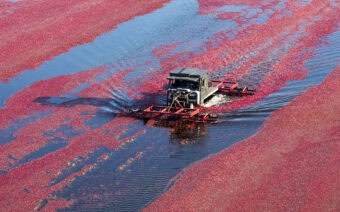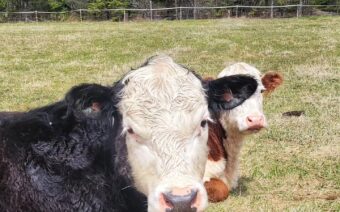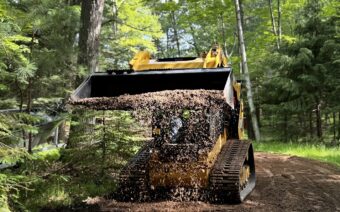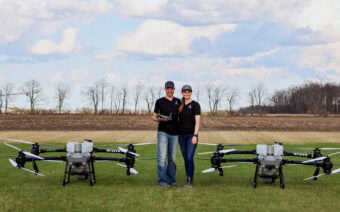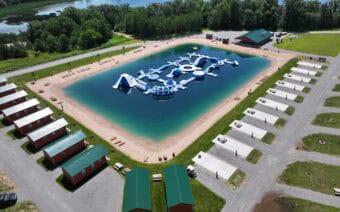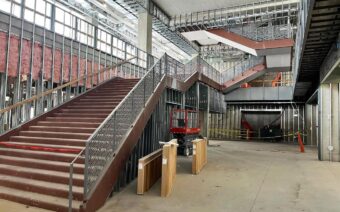
March 4, 2024
STEVENS POINT – According to the Division of Agricultural Development at the Wisconsin Department of Agriculture, Trade and Consumer Protection, an aging farmer population, with younger generations opting for other careers is one of the major causes for the decline of farms in the State of Wisconsin in the last few decades.
The Feltz family in Stevens Point, however, continues to carry on the legacy of its family farm – now in its fifth generation of ownership.
At the helm of the farm and dairy store – located at 5796 Porter Drive – are Owner/operators Jackie and Ken Feltz.
The family operation’s sixth generation – Ken and Jackie’s children Taryn, Jake and Jared, along with Jared’s wife, Jenna – also work on the farm.
Jake, who currently manages Feltz’s Dairy Store along with sibling Taryn, said there are several other big reasons for the decline in farms – all of which the Feltzs seem to be taking in stride.
“No. 1, it’s getting to the next generation,” he said. “We don’t have a problem with that with our bigger family, but the next generation still has to be willing to take over. Families aren’t as big as they used to be.”
Acceptance of technology, or lack thereof, Jake said, is also another factor.
“My dad was willing to accept technology, despite some early apprehensiveness,” he said. “He’s about to turn 60 this summer, and he wasn’t as willing to learn (the new technology) at first. If it was up to him, I’m not sure we’d have robots. I have to give credit to my older brother – we grew up with a lot of technology – so he was excited to pursue that. My dad let my brother take the reins (in terms of technology on the farm).”
Jake said another reason for the decline is the lack of willingness to expand.
“There was a time where prices were low, which as a farmer, is part of the game,” he said. “You have to be a price-taker. My dad was willing to expand through those low prices to get through it and specialize in getting good at one thing.”
Jake said when he was a young kid himself in the late ’90s and early 2000s, his dad had more variety on the farm.
“He milked cows, grew cash crops and had a few different types of animals – but probably considered himself average at everything,” he said. “Instead of doing all those different things, he decided to get good at milking cows and became an expert at that – expanding that part of the business. You have to be willing to make changes and do whatever you need to do to survive.”
Another hurdle, Jake said, is competition from substitute milk products – such as oak, soy and almond milk.
“Fluid milk consumption has steadily dropped over the years (partly because of that),” he said. “(However), the good thing, especially here in Wisconsin, cheese, ice cream and yogurt consumption is still strong and trending upward. Butter is also used for baking, and that’s been a strong component of the dairy industry.”
A bit of history
Established in 1913 by Polish immigrant Peter Feltz, the family farm has been passed down from one Feltz to the next over the past century-plus – from Peter to George to Ken, with plans of Jared carrying the torch into the next generation.
“My brother does more on the animal side of things,” Jake, 28, said. “My brother has three kids – with a fourth on the way – and I think there is potential for a seventh generation in the future. I’ve also got a two-year-old and another on the way.”
Getting its start focusing mostly on green beans, sweet corn and peas when Ken and Jackie purchased the farm in 1995, Jake said the focus eventually shifted to dairy cattle – which is the farm’s main focus today.
“We also grow corn silage and alfalfa for our herd of 600 cows,” he said.
In November 2016, Jake said the farm installed its first two milking robots.
“We’ve added six robots since,” he said.
Though the concept has remained consistent – cows enter the milking barn, are milked and exit – Jake said the addition of robot milking machines has changed the how quite a bit.
“When I was a kid, our parlor could milk eight cows at a time,” he said. “Since then, it’s still roughly the same process – you have a milking machine and the cow comes into the robot. It always used to be by hand, but now, the robots do one cow at a time. It’s all up to the cow (on when they get milked) – they each have a chip in their ear.”
From there, Jake said, the cows pass through a computerized gate.
“Everything is based on time, so if the cow is ready to give milk, (the gate) will let the cow into the robot for milking,” he said. “Instead of people attaching the machine, there is a robot arm that cleans the cow off and attaches the machine. Robots are like cell phones – they keep updating and getting faster and faster. It reduces labor, for sure.”
Expansion
In 2017, Feltz’s Dairy Store – an on-site farm store offering dairy products, agricultural items and local specialty goods, such as honey, soy candles, maple syrup and apparel items – was added.
The most recent expansion, Jake said, took place in 2021 when the Feltz family added a small cheese plant, with Jake acquiring his cheese-making license.
“It’s the size of a kitchen and quite small,” he said. “We take warm, fresh milk right off the robots and make fresh curds. That is next to the store and barn. I got my cheese-making license and started with that during the COVID-19 pandemic. When it was all said and done, it probably took more than two years to get certified – between in-person, online, etc. I did that through the University of Wisconsin-Madison and -River Falls. It also included in-person training and a written exam.”
Jake said the dairy store includes upward of 300 varieties of cheese
“We work with quite a few cheese plants across the state,” he said. “We’ll generally get the cheese in bulk and either repackage it on-site or get it packaged directly from the plant. There are a ton of flavors, too – we’ve probably got 25 different flavors of cheddar. The more we look, the more we can find.”
In Wisconsin alone, Jake said there are more than 3,000 varieties of cheese made.
“As our customer base grows, we keep adding more varieties of cheese,” he said.
Jake said the store also makes its own pizzas and has cheese trays and other cheese and sausage snacks available.
The shop also sells pre-made cheese boxes for the holidays and ships to anywhere in the continental United States.
Customizable boxes are also available.
Currently, the cheese plant only makes cheese curds, but “we’ve gone back and forth on the topic” of making other kinds of cheese.
“Being a smaller cheese plant and dairy farm, there are a lot of places that are larger and have specialized in things and make high-quality cheese,” he said.
Jake said another aspect of diving into other cheese products is price.
“For us, we can purchase the cheese for the same price or even cheaper than what we could make it on our own,” he said. “Right now, I think we’re just going to stay the same with curds but might try to expand with that production a bit. Maybe we’ll add some specialty items.”
Jake said when he got his cheese-making license, he had visions of making more than cheese curds – “but things change.”
“I thought maybe we’d be making some basic cheeses, but once you start spreading yourself too thin and doing a lot of things, quality could decline a bit,” he said.
Education aspect
Recognizing the importance of sharing their agricultural knowledge with the public, Jake said they have a space in the retail building that serves as an education corner.
“It’s relatively limited inside the store, but we have a video playing where you can see the robots and an overview of the farm,” he said.
Jake said once spring rolls around, they add lots of family activities outside.
“We have a petting zoo and try to cater to families from spring to fall,” he said. “We’ve added a kids’ activity area outside. The winter gets tough, though.”
Jake said the family grows and sells pumpkins each year, as well as creates a 10-acre corn maze, which is sponsored by a different business each year.
The future
Jake said the future looks bright for Feltz Family Farms.
“The plan right now is to have the ownership change from my parents take place maybe next January,” he said. “It takes longer to make sure things are right than most people might think – you want it done the right way. From an outsider’s perspective, it might seem easy to have a family business, but it’s not.”
Jake said his parents have worked hard to build upon the legacy the earlier Feltzes created, and “it’s not easy to let go.”
“My dad’s life is those cows,” he said. “I’ve always respected how he’s let things go and let us be more actively involved.”
For more information on Feltz Family Farms and Dairy Store, find it on Facebook or visit feltzsdairystore.com.
 WATCHMAN FLX Pro: Preventing strokes to the best of its ability
WATCHMAN FLX Pro: Preventing strokes to the best of its ability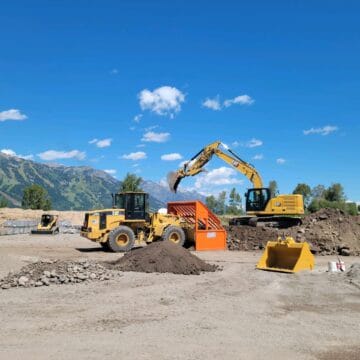 ‘I don’t believe in trying, I believe in doing’
‘I don’t believe in trying, I believe in doing’


